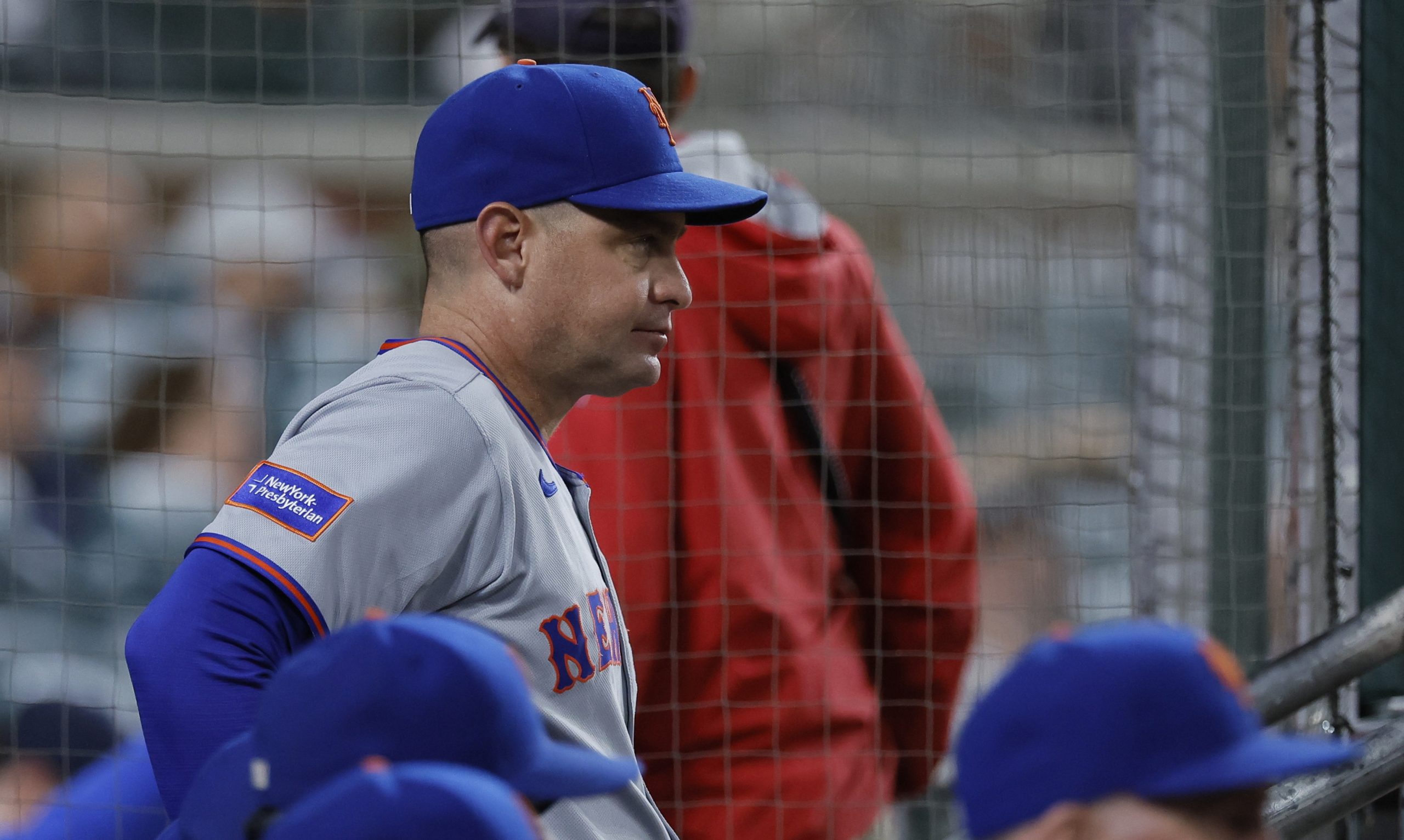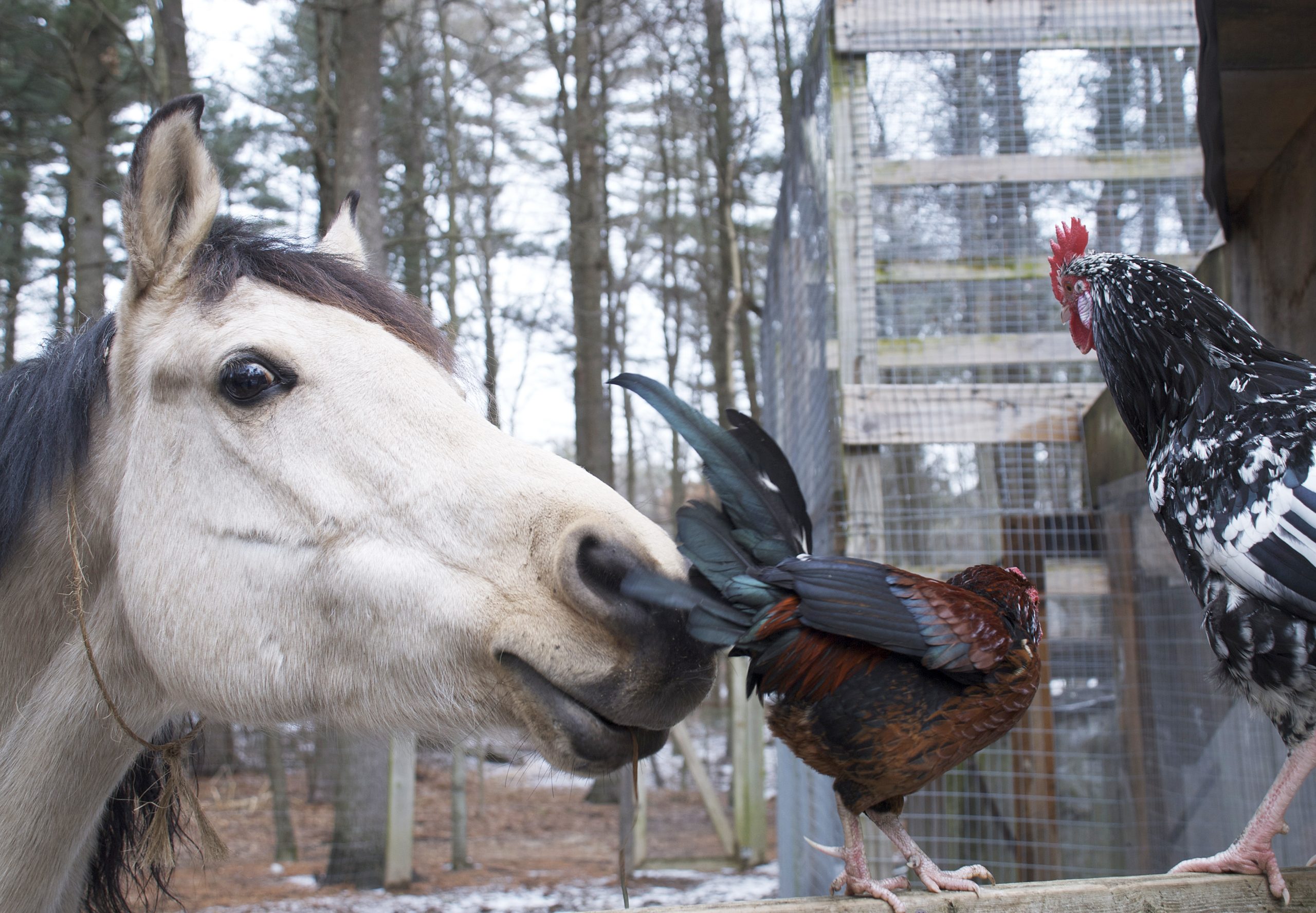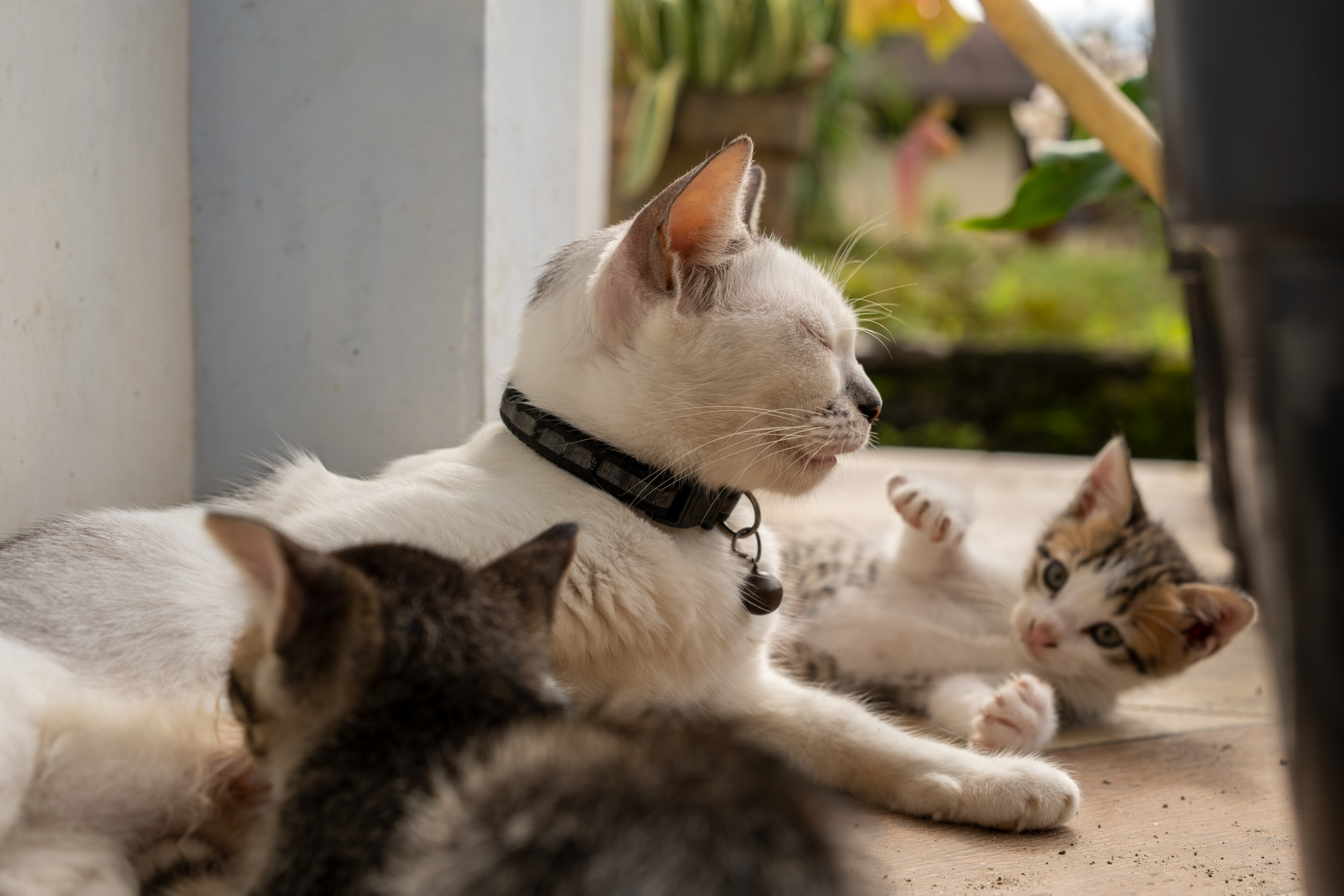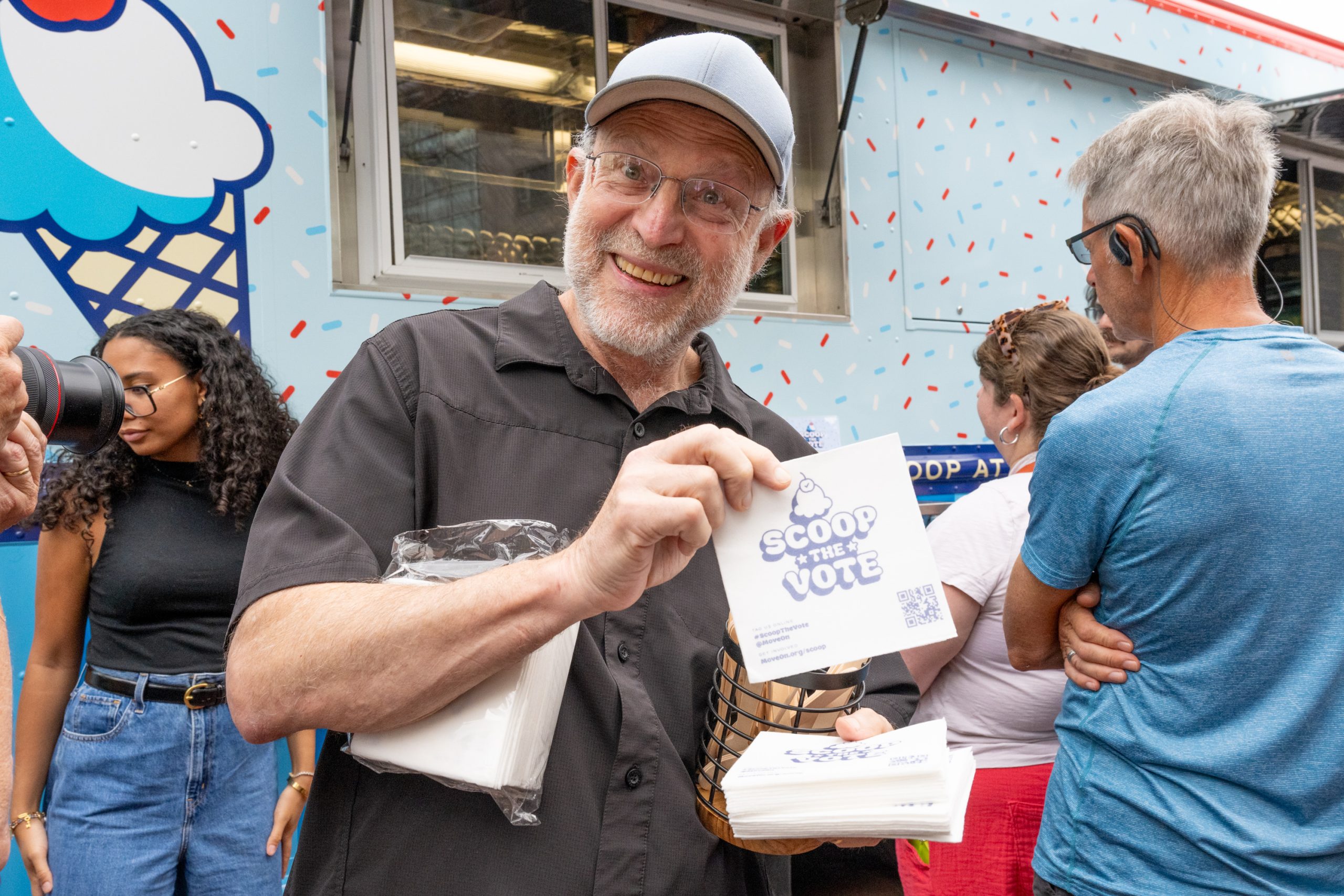
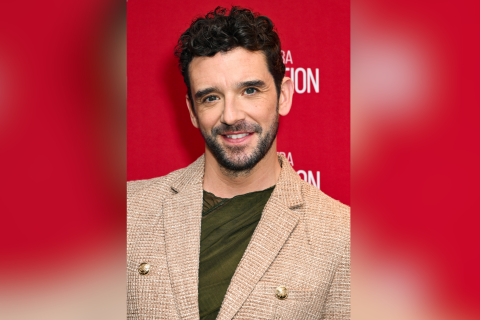
Olivia Wong/Getty Images for SAG-AFTRA Foundation
“Until there’s a level playing field, representation is important and does matter.”
Nearly 20 years after he shot to fame as Marc St. James on Ugly Betty, Michael Urie is celebrating a career high with his first-ever Emmy nomination for playing Brian in Apple TV+’s Shrinking. “I felt like I’ve had imposter syndrome for forever. Like before I even knew I wanted to be an actor, I thought I couldn’t, because who becomes actors? It just seemed so unattainable.” Now the actor gets texts from people like his co-star, Harrison Ford. “I mean, we don’t text that often, but when his name pops up, it is wild.” On Shrinking, Urie’s Brian is the best friend to Jason Segal’s Jimmy, a widower grieving the killing of his wife by a drunk driver, Louis [Brett Goldstein], who is introduced to the group of friends in season two. “It was such a moving thing to bring this character to the show and audacious [for a] comedy plot device, then they chose my character to be the one that brings them in.” As for the everlasting appeal of Ugly Betty, Urie says he’d “absolutely” do a reboot. “We all would. We’re all still super tight…. I think it would be really interesting.”
SUBSCRIBE TO THE PARTING SHOT WITH H. ALAN SCOTT
ON APPLE PODCASTS OR SPOTIFY AND WATCH ON YOUTUBE
Editor’s Note: This conversation has been edited and condensed for publication.
So congrats on your Emmy nomination for playing Brian on Shrinking. Your post reacting to your Emmy nomination went viral because it was screenshot of a text you received from your costar, Harrison Ford. So my first question to you is, what is it like to have Harrison Ford’s phone number?
It still gets me when, I mean, we don’t text that often, but when his name pops up, it is wild. My entire life, I’ve known him, all of us have, our entire lives, he has been a household name, and he is a true movie star. So it’s wild.
This moment must be very special for you. I mean, we’ve known you since you played Marc St. James on Ugly Betty. You’ve been around. So to get an Emmy nomination now, at this point in your career, what does it mean to you?
It’s very gratifying. I mean, I felt like I’ve had imposter syndrome for forever, like before I even knew I wanted to be an actor, I thought I couldn’t, because who becomes actors? It just seemed so unattainable. I wanted be a drama teacher in high school because my drama teachers were awesome and that’s who I idolized. That’s what I thought I wanted to do. And then, a few people encouraged me, a few things happened while I was in high school, and I thought, well, maybe I could be an actor. So I’ll audition for drama school, but I probably won’t get it. And then I went to drama school and I learned how to do theater and I thought, great, I’ll do theater. And then I wasn’t getting theater jobs. I mean, I would get some, but I wasn’t getting the ones that I thought I would. I thought would get these Shakespeare plays because I learned Shakespeare, and thought I was good at Shakespeare. And then I got Ugly Betty, kind of almost by accident. And it became this huge thing. So it was a major break. And thanks to people like Vanessa Williams, and Silvio Horta, the creator, I was put front and center on that show kind of quickly. I was supposed to only be in one episode. I played Vanessa Williams’ assistant, she [Williams’ character Wilhelmina Slater] was supposed to have a new assistant every episode, cause she was an impossible boss. And we were shooting the pilot, and I had this idea that I would like physically mimic her, that I wanted to be her, so if she stood like that, I would. I would sit at the same time as her, but I was always behind her, so she didn’t know I was doing it. And somebody on the crew ratted me out. They were like, “Hey Vanessa, you know what that queen’s doing behind you?” And she was like, “What?” And she loved it. She came over and she was like, “I hear you’re doing me behind me.” And I was like I’m fired, that’s it. She goes, “What else can I do that you can do?” So suddenly I’m pitching her. The whole gig was just me and her pitching each other ideas and then by the end of the pilot they put me in the cast photo. And she could have very easily said, “No, you’re not doing that. You’re not standing behind me anymore.”
And instead, you became an iconic part of Ugly Betty. A show like that, and a character like that, could really pigeonhole you into one type of character. But that didn’t happen with you. So now, almost 20 years later, you’re nominated for an Emmy on a show with Jason Segel and Harrison Ford. How does that feel?
It feels amazing. I think the writing on the show is so smart. This character that I play is in many ways like an ancillary character to the core of the show. I play Jason Segel’s best friend. It’s part a workplace comedy, part a neighborhood comedy. I don’t work there, I don’t live there. So my character comes in sort of random ways and this huge story that they put into the second season with a major guest star, Brett Goldstein’s character. Who is one of the creators and writers. The premise of the show is Jason Segel’s [character’s] wife was killed in a drunk driving accident and season two they introduced the drunk driver to the gang basically and essentially forgive him. I’m getting chills talking about this. It was such a moving thing to bring him into the show, to bring this character to the show and audacious [for a] comedy plot device, then they chose my character to be the one that brings them in, which, on the one hand, is a surprising choice because my character’s sort of outside the main crux of the show. But on the other hand, it’s inevitable that it be me. So that was all thrilling. Getting nominated for an Emmy is icing on the cake, but the real prize was that juicy arc. To get to play that character that brings Louis into the fray and helps everybody get to a point where they can forgive him for this crazy thing. So the prize is the work, is the role, and to get play like an adult dude with real problems and being gay isn’t one of them.
That’s huge, and unfortunately so rare on TV. Your character also shows the power of the outsider, of a supporting character, how they can help move the story along, add new elements to it, conflict. It’s a delicate balance, adding to the story without being the story.
That’s a really interesting way to put it. But I think that’s true. I think the device of a supporting character is how do you mix things up for the main character? How do you cause a problem or solve a problem for the main character? And you’re right, I think the outsider is the one to bring a character like this in. And it worked really well. When I first read it, it’s in episode four that it begins, that Brian first meets Louis. And I was like, oh my gosh, it’s me. And it was also the end of the episode. In a show there’s the cold open, and then there’s a last moment before it goes into the credits. That’s a very exciting thing to be when you’re an actor. Like, oh, I got the button of the cold opening.
Everyone’s going to see you before the commercial. It’s very cool.
And then the end of an episode is always very exciting. So that was an episode where I had the last moment of the episode.
I also want to talk about Oh, Mary!, because you’re in it on Broadway. How does it feel to be in the coolest show on Broadway right now?
I feel real cool being in Oh, Mary!. It is a perfect play. And I’m an off-Broadway rat, too, and so that it started at the [Lucille] Lortel [Theatre], one of our best, most dangerous theaters. And it was a huge hit there. It was the show of the summer and then moved to Broadway. And I remember, I was doing a show across the street from the Lyceum. Our stage door was across the street from the box office of the Lycieum. And I remember when tickets went on sale and there was a line around the block. And I was going to my show and thinking, “Wow, now it’s gonna be a hit on Broadway.” And I had this kind of like melancholy about it, because I thought, “Well, I’ll probably never get to be in that show. But I get to just love it from afar and champion it in my own way and be proud of it as an off-Broadway queer person.” And literally the night before they offered me Mary’s teacher, my partner and I were at dinner and we were just talking about Oh, Mary!, like we do. And literally the next day, they offered me Mary’s teacher. And I thought, I just never imagined I would get to be in that show.
Speaking of off-Broadway, you’re gonna be in Richard II starting in October, right? So you clearly can do Shakespeare. How excited are you for that?
Well, that’s sort of my baby. It’s like a bucket list part. Richard II is thought of as the vain king, kind of the queer king. He’s played kind of gay sometimes. And so I’ve been chasing it. It’s a part I wanted to play, because it’s beautiful language, but also because I feel like there’s some great power in telling a story that is 400 years old now that will resonate in a very different way. And we’re gonna do it in a modern dress setting, but it’s all Shakespeare’s words, and the Red Bull Theater Company—who I’ve worked with a bunch of times—they’re fantastic, and they know exactly how to do a new twist on an old play. So, I kind of made them do it, like I sort of forced everyone into it.
I also need to ask you about Pride Plays, which is so impressive. To give a voice to so many people who sometimes would struggle to get their plays produced. Tell me about it.
Thank you for asking about Pride Plays. Pride Plays was started as a festival to commemorate the 50th anniversary of Stonewall, six years ago. And we wanted to celebrate it with the Rattlestick Theater, downtown [NYC]. We wanted to celebrate the milestone, but we also wanted to make a festival of plays about the way the world can be and should be. We wanted to put on plays that were prideful. We didn’t want to do torture porn. We didn’t wanna do a bunch of coming out stories. Those stories are important for sure. AIDS plays are important. Coming out plays are important. Hate crime plays are important, and definitely have their place and can definitely help and teach people, but we also can spread joy, and we can also be an example of the possibilities of queerness and the future of queerness and all of the many letters in the acronym and colors in the rainbow.
So, we thought we’ll do four or five plays, and then as we looked into the demographics of the community. We were like, oh, we can’t feed all these mouths with four plays. We ended up doing 19 plays that first year, and I think did a pretty good job of reaching all the corners of the community. We wanted to make queer stories for queer people by queer people, because representation is also really important. I don’t think that there’s a hard-and-fast, black-and-white rule about representation: I believe queer people can play straight people and straight people can’t play queer people, but until there’s a level playing field, I think representation is important and does matter and at Pride Plays, we are very conscious about that. I mean, I’m on TV and Jesse Tyler Ferguson is on TV, Andrew Rannells, we’re on TV. And so very often it’s the three of us up for something. Or if I can’t do it, Jesse does it, or vice versa. Or I get mistaken for Andrew Rannells. And like, I love those guys, I am honored to be in their company, but we’re not actually alike. We’re not that similar. And so, that was another problem. I’m sure this is true in any industry, but when you wanna get into a certain level of your business, your work, we’re often told you need more experience. You’re not gonna get it because you’re not experienced, but how do you get experience without experience? And so in show business, and especially when you’re like a gay guy on TV, that’s an easy in. I was on TV, so now I’m getting into rooms. I couldn’t get arrested in theater in New York until I was in Ugly Betty.
We also wanted Pride Plays to be a more entry-level, mid-level opportunity for people to get experience. People who aren’t getting in the rooms, aren’t in the doors as actors, directors, writers. We wanted to make a place where we were able to take a chance on people that had less experience.
My last question for you, and it’s about Ugly Betty. It’s still very much a part of the cultural conversation. You have the podcast, Still Ugly, which is amazing, with your costar, Becki Newton. Would you entertain the idea of a reboot? And where would Marc St. James be today?
Great question. Absolutely, I would be into a reboot as we all would. We’re all still super tight.
One of you is an Oscar nominee now.
America Ferrera was nominated for an Oscar. Vanessa Williams is currently playing Miranda Priestley in The Devil Wears Prada [musical]. And Mark Indelicato, who was 11 when we started, is now on Hacks. It’s amazing. So yeah, I think a reboot could be really interesting. And I think the only world that makes sense is that Marc is still with Wilhelmina somehow. I mean, he must have been promoted. I mean, that’s the tricky thing, Betty and Marc and Amanda can’t be assistants anymore. Maybe Amanda could. Maybe Amanda can still be a receptionist. But I think they would have to have somehow moved up. At the end of the series, Betty moved on to another world. So it would have be something about her coming back to fashion for some reason. I don’t know, but there is a good idea in there somewhere. I don’t know what it is, but somebody could crack it easily. And I think it would be really interesting to see. It would be fun. Why is Marc still working for Wilhelmina? Is it a healthy relationship? Why is Betty coming back to fashion? It’s exciting. It could be really cool.
